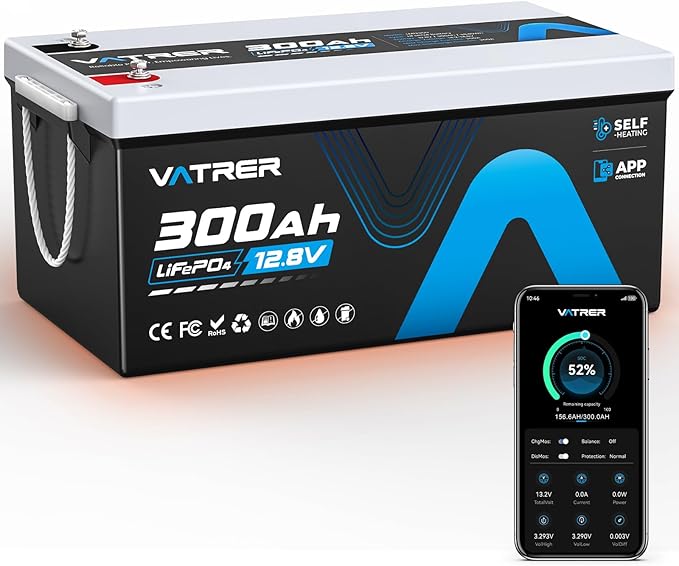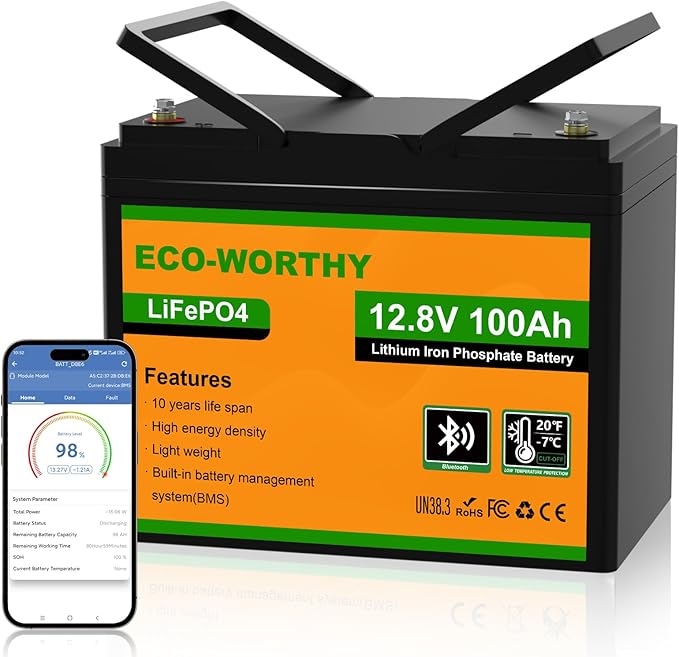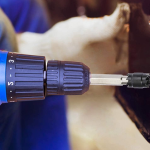Are you ready to upgrade your mobile power? Discover the Best Lithium Batteries for RV for a reliable, lightweight, and long-lasting energy solution on your next road trip.
The transition from traditional lead-acid to lithium iron phosphate (LiFePO4) technology has revolutionized power for RVs, vans, and off-grid setups. These newer batteries offer significant advantages, including a deeper depth of discharge (DOD), a dramatically longer lifespan, and a much lighter weight, which is crucial for managing your vehicle’s payload. Moreover, they deliver a consistent voltage output, ensuring your appliances and electronics run smoothly without performance drops. We’ve analyzed the market to bring you the top performers, focusing on key features like built-in safety systems (BMS), high power output, and the all-important cold weather performance.
Ultimately, choosing the right battery depends on your specific energy needs—whether you’re a weekend warrior or a full-time RVer. In addition, factors like physical size, capacity (Ah), and the maximum discharge rate are essential to consider. To help you power your adventures reliably, we’ve rigorously reviewed a dozen market-leading options. Next, we’ll dive into the detailed reviews, but first, take a look at our comparison table of the top five Best Lithium Batteries for RV to get started.
Top 5 Best Lithium Batteries for RV
12 Best Lithium Batteries for RV Review
1. VATRER POWER 12V 300AH Bluetooth LiFePO4 Battery
The VATRER POWER 12V 300AH is built for the serious full-timer or off-grid enthusiast who can’t compromise on power, even in extreme conditions. This high-capacity unit is equipped with a robust 200A BMS and a standout automatic self-heating function, making it a perfect match for those who travel through or live in cold climates. Designed using automotive-grade LiFePO4 cells, it ensures uncompromising quality, high energy density, and superior stability, all while delivering a massive 2560W of power—ideal for running demanding RV appliances. The sheer capacity and premium features target users needing reliable, long-term power storage. (100 words)
First, the automatic self-heating is a game-changer, activating below $41^\circ\text{F}$ and enabling safe charging in temperatures as low as $-4^\circ\text{F}$—a feature many standard lithium units lack. The upgraded 200A BMS provides excellent protection against typical issues like overcharging, while the exceptional longevity promises 5,000+ deep cycles, significantly minimizing replacement costs. However, a minor drawback is the requirement for a charging current of more than 10A to activate the heating function. Moreover, its impressive capacity means it’s heavier and larger than smaller units, but its lightweight design for its capacity makes transport easier than equivalent lead-acid. (100 words)
In summary, the VATRER POWER is an outstanding choice for RVers and van lifers who prioritize year-round usability and high energy demands. Its integrated heating system solves the core problem of cold-weather charging, setting it apart from competitors. While it’s designed for energy storage rather than starting, its combination of 300Ah capacity, 200A BMS, and self-heating positions it as one of the premier power solutions for any extensive off-grid or marine application. (84 words)
| PROS | CONS |
|---|---|
|
|
2. ECO-WORTHY 12V 280Ah LiFePO4 RV Battery w/Bluetooth
The ECO-WORTHY 12V 280Ah LiFePO4 Battery is designed for the modern RVer who values both high-capacity power and smart management. Offering 3584Wh of energy and supporting up to a 1120Ah system via parallel expansion, it’s a powerful solution for trailers, campers, and solar systems requiring significant energy reserves. The integrated Bluetooth connectivity allows for real-time monitoring of voltage, capacity, and current via a dedicated app, providing peace of mind and hassle-free operation. This unit targets users who need a large, expandable power source with advanced digital oversight. (94 words)
One key feature is the low-temperature cutoff protection, a crucial component of the 200A BMS, which prevents charging below $19.4^\circ\text{F}$ to safeguard cell health—though it lacks the active heating of some competitors. The internal metal frame uses advanced compression fixture for enhanced shock stability, ensuring durability on rough roads. Moreover, this battery supports flexible expansion up to 4S4P, making it highly versatile for both 12V and 48V systems. A slight drawback is the recommended 14-hour charge time with a standard 20A charger, meaning users might need to invest in a faster unit for quick turnarounds. (100 words)
Overall, the ECO-WORTHY 280Ah is an excellent mid-to-high capacity option for RV and marine use, providing a great balance of power, durability, and smart technology. The combination of robust construction and the monitoring app makes troubleshooting easy and operation efficient. If you are looking to build a large, scalable, and intelligent power bank for your mobile system, this unit with its flexible expansion capability is a strong contender. (80 words)
| PROS | CONS |
|---|---|
|
|
3. Weize 12V 100Ah TM LiFePO4 Deep Cycle Battery
The Weize 12V 100Ah LiFePO4 Battery is a fantastic entry-level option and a perfect drop-in replacement for a Group 31 lead-acid battery, offering a significant performance upgrade without the bulk. Specifically marketed for trolling motors and lighter RV use, this unit is an excellent choice for weekend campers, small vans, or those who need a reliable backup power source. Its main selling point is the combination of long cycle life (2000+ cycles at 100% DOD) and exceptional lightness at only 26.4 pounds, making it incredibly easy to handle and install. (95 words)
The integrated Smart BMS is equipped with a crucial low-temperature cut-off function, automatically stopping charging below $32^\circ\text{F}$ to protect the cell chemistry and ensure safe use in colder environments. Moreover, the battery features automatic reactivation after a circuit cut-off, a helpful feature that eliminates the need for high-voltage input to restore power. However, be aware that the manufacturer specifically cautions against using this as a car starting battery. Furthermore, the maximum connection limit is four batteries in series or parallel, which may limit expansion for very large, high-voltage systems. (100 words)
The verdict is that the Weize 100Ah battery offers an unbeatable value proposition for moderate deep-cycle needs, especially for those using it for a trolling motor or a minimal RV setup. It’s significantly safer and lighter than its lead-acid counterparts and includes the necessary cold weather protection to maintain its longevity. If your power demands are relatively modest and you need a high-quality, reliable, and easily portable 100Ah solution, this unit is highly recommended. (85 words)
| PROS | CONS |
|---|---|
|
|
4. Battle Born Batteries 100Ah 12V LiFePO4 Battery
Battle Born Batteries is one of the most respected names in the RV power market, and their 100Ah unit is a flagship product designed for premium reliability. This 12V LiFePO4 battery is an easy, drop-in replacement for Group 27 and 31 lead-acid batteries, delivering 100Ah of usable power in a compact package. This battery is built for the long haul, targeting users who need a proven track record of quality and superior performance in demanding applications like full-time RVing, marine, and industrial use. Its extremely long cycle life of 3,000–5,000 deep discharges is a major selling point. (94 words)
Performance-wise, the internal BMS provides comprehensive safety features, including both high and low-temperature protection, which automatically stops charging when temperatures drop to prevent cell damage. Moreover, its rugged design allows it to be mounted in any orientation and wired flexibly in series or parallel, offering excellent versatility for complex installations. At just 31 pounds, it is remarkably lightweight for a 100Ah battery, further easing installation. The primary drawback compared to some newer units is the lack of built-in features like self-heating or Bluetooth monitoring, relying instead on its core rock-solid reliability. (100 words)
This battery remains a top-tier choice for any RVer seeking a high-quality, reliable, and durable power source. While it comes at a higher price point than budget alternatives, the longevity (up to 10-15 years) and the exceptional US-based customer support justify the investment. If brand trust and core performance features like safety and longevity are your main priorities for your power bank, the Battle Born 100Ah unit is hard to beat among the Best Lithium Batteries for RV. (90 words)
| PROS | CONS |
|---|---|
|
|
5. Litime 12V 200Ah Plus LiFePO4 RV Battery
The LiTime 12V 200Ah Plus is a high-efficiency power bank built for RVers seeking a substantial capacity upgrade without excessive weight. Featuring EV Grade Cells and a built-in 200A BMS, this battery delivers 2560Wh of energy and a stable performance profile. The flat discharge curve means it maintains voltage above 12.8V for almost the entire capacity usage, a major benefit for sensitive electronics. This unit targets users who need a high-amperage battery for running demanding 12V systems like inverters and air conditioners. (93 words)
First, the unit boasts a long 10-year lifespan with over 4,000 deep cycles, offering 10 times the life of standard lead-acid batteries and ensuring low maintenance costs. Its superior energy density allows it to pack 2560Wh into a relatively lightweight 45.59-pound package. Moreover, the 200A BMS offers over 20 protection functions, providing enhanced safety and extending battery life. While it has a high-efficiency charge temperature range ($32^\circ\text{F}$–$122^\circ\text{F}$), it does not include an active heating system, meaning charging stops at the freezing point. The user-friendly design ensures it fits standard RV battery boxes. (100 words)
In conclusion, the LiTime 200Ah Plus is a phenomenal value-for-money proposition for a high-capacity, high-output battery. The large capacity and robust 200A BMS make it ideal for complex off-grid setups where running high-draw appliances is necessary. If you can manage without cold-weather charging (i.e., you don’t winter camp in freezing conditions) and need a reliable, efficient, and easily scalable power solution, this unit is a primary recommendation. (84 words)
| PROS | CONS |
|---|---|
|
|
6. NewtiPower 12V 330Ah Small Size LiFePO4 Battery
The NewtiPower 12V 330Ah is a true powerhouse, offering one of the highest capacities on this list while maintaining a surprisingly compact size. With 4224Wh of energy and a 200A BMS, this battery is built for those with extremely high power demands, such as large RVs running multiple appliances or comprehensive off-grid home systems. The manufacturer emphasizes full capacity and quality Grade A cells, targeting buyers who need maximum power density in a confined space. This battery boasts an incredible 10,000+ rechargeable cycles, highlighting its commitment to longevity. (95 words)
Its main strength is the combination of huge capacity (330Ah) and relatively small dimensions, thanks to its high energy density cell composition. The intelligent BMS provides essential temperature protection, automatically cutting off charging at $32^\circ\text{F}$ to prevent damage. Furthermore, it supports flexible series and parallel connections, making it versatile for systems up to 72V. However, the manufacturer’s reminder to check the battery size carefully suggests that while the size is compact for its capacity, its dimensions may still be challenging for older, smaller battery compartments. The sheer energy capacity means this unit is also quite heavy. (100 words)
In essence, the NewtiPower 330Ah is an industrial-grade solution for residential and heavy-duty mobile applications, providing a massive 30Ah advantage over standard 300Ah models. Its exceptional cycle life translates to a minimal long-term total cost of ownership. If you require the highest Ah rating and energy storage possible in a space-conscious footprint for your larger RV or solar system, this is a premium contender among the Best Lithium Batteries for RV. (86 words)
| PROS | CONS |
|---|---|
|
|
7. ECO-WORTHY 12V 100AH LiFePO4 Lithium Battery with Bluetooth
The ECO-WORTHY 12V 100Ah LiFePO4 Battery is the ideal solution for boaters and RVers looking for a lightweight, Group 24-sized power upgrade with smart monitoring capabilities. This unit features a built-in 100A BMS and Bluetooth 5.0, allowing users to check the battery’s status, voltage, and remaining life in real-time from their phone. It delivers 1.28kWh of energy, perfect for moderate systems like small RVs, trolling motors, and cabins. The lightweight design (only 23.15 lbs) makes it exceptionally easy to handle and a great replacement for heavy lead-acid units, targeting users needing portability and convenience. (96 words)
The Bluetooth Real-Time Monitoring is a key differentiator, providing instant diagnostics and simplifying troubleshooting by avoiding complex meter readings. The battery is manufactured with UL, IEC tested, and certified automotive grade cells, ensuring maximum safety and stability. The 100A BMS includes a reliable low-temperature cut-off protection, preventing charging below $19.4^\circ\text{F}$ to maximize battery life in winter. A potential drawback for high-draw systems is the 100A BMS, which is lower than the 200A found in larger models. This limits the maximum simultaneous load compared to higher-capacity options. (100 words)
Overall, this ECO-WORTHY battery is a perfect fit for BCI Group 24 applications where low weight and smart monitoring are paramount. The combination of easy fitment, reliable low-temp protection, and the convenience of the mobile app makes it a strong contender in the 100Ah class. If you’re upgrading an existing Group 24 lead-acid battery for your RV or boat and want modern digital insights, this lithium option is highly recommended. (85 words)
| PROS | CONS |
|---|---|
|
|
8. dumfume 12V 300Ah Lithium LiFePO4 Battery
The dumfume 12V 300Ah LiFePO4 Battery is a high-capacity option prioritizing longevity and safety for long-term RV and off-grid use. Delivering an impressive 3840Wh of energy and equipped with a 200A BMS, this battery is built to power extensive electrical setups. Its main selling point is the extra-long cycle life, promising 4,000 cycles at 100% DOD and an astounding 15,000 cycles at 60% DOD over a 10-year lifespan. This unit targets users who demand maximum durability and a minimal replacement cycle for their backup power or solar storage. (98 words)
The battery’s construction focuses on durability, featuring a high-strength, impact-resistant ABS casing that excels in heat and weather resistance. The 200A BMS provides a comprehensive suite of protection, including an automatic high/low temperature cut-off function to ensure safe charging and discharging in varying climates. Furthermore, its compact size and low weight (only 57 lbs for 300Ah) make it easy to install and transport. A minor consideration is that the manufacturer uses the vague term “Other Than Listed” for the cell composition, which may cause some buyers to seek greater transparency on the internal components. (100 words)
In conclusion, the dumfume 300Ah battery stands out for its exceptional cycle life and robust, safety-focused design, making it an incredibly cost-effective choice over the long term. Its high energy density and powerful output make it an ideal backbone for any large RV, camper, or home solar storage system. If your primary focus is on long-term reliability and maximizing the years of service from your battery bank, this high-cycle unit is a very strong contender. (88 words)
| PROS | CONS |
|---|---|
|
|
9. TEMGO 12V 300Ah Self-Heating LiFePO4 Lithium Battery with Smart Touch Screen
The TEMGO 12V 300Ah LiFePO4 Battery is a high-tech solution designed for RVers who demand both massive power and superior diagnostics. Delivering 2560W of power, this battery stands out with its dual monitoring system: an integrated smart touch screen and a Bluetooth App. The combination provides instant, easy-to-read data on voltage and state of charge without external shunts or meters. It targets users who frequently travel in cold climates and appreciate advanced digital control over their power system. The built-in automatic self-heating is a major asset for winterizing. (99 words)
The self-heating function is crucial, activating when the temperature drops below $32^\circ\text{F}$ and enabling safe charging in freezing conditions—a feature that significantly extends the usability of the battery year-round. The 200A BMS provides superior safety against overcurrent and short circuits, protecting the high-quality LiFePO4 cells. Furthermore, the 5,000+ cycle life ensures a long service period. The size and weight are comparable to other 300Ah models. A minor point is that the smart touch screen, while convenient, is an additional component that could potentially be damaged, though it’s designed to be robust. (100 words)
In summary, the TEMGO 300Ah is a premium option for full-time RVers and off-grid enthusiasts who need a powerful, cold-weather-ready battery with excellent monitoring. The seamless integration of both Bluetooth and the touch screen offers unparalleled ease of use for diagnostics and status checks. If your journeys take you into freezing conditions and you are looking for a highly capable, self-managing battery with advanced display features, this model is a standout choice. (87 words)
| PROS | CONS |
|---|---|
|
|
10. LiTime 12V 300Ah Lithium LiFePO4 Battery
The LiTime 12V 300Ah LiFePO4 Battery is a high-capacity unit focused on exceptional longevity and maximum system scalability. Featuring Grade A Automotive Cells and a UL-certified 200A BMS, this battery delivers 3840Wh of energy and supports a maximum 2560W power output. The key appeal is its cost-efficiency, boasting a lifespan of up to 10 years and 4000-15000 cycles, which drastically reduces the total cost of ownership compared to lead-acid. This battery targets serious solar system builders and RVers needing a high-quality, long-term power solution with a high degree of expansion capability. (97 words)
The scalable capacity is exceptional, supporting configurations up to 4S4P for a massive 40.96kW system—ideal for large home energy storage or comprehensive RV power walls. The 200A BMS provides a robust protection system against all major faults, ensuring stability and safety. Furthermore, its impressive energy density means it’s only one-third the weight of a comparable lead-acid battery. A crucial consideration is that this unit, like many standard LiFePO4 batteries, does NOT have a self-heating function, meaning charging must cease below $0^\circ\text{C}$ to protect the cells. However, its longevity makes it a smart investment. (100 words)
Ultimately, the LiTime 300Ah battery is a premium power solution that excels in providing massive, reliable, and highly scalable energy. The focus on certified cells and a high-amp BMS ensures it can handle demanding loads. If you plan on building a large, powerful system and prioritize longevity and cost savings over extreme cold-weather charging capability, this model offers a compelling combination of features. It’s one of the most reliable options among the Best Lithium Batteries for RV. (87 words)
| PROS | CONS |
|---|---|
|
|
11. HumsiENK 12V 300Ah Bluetooth LiFePO4 Lithium Battery
The HumsiENK 12V 300Ah Battery is engineered for maximal longevity and high-power output in both RV and home energy storage applications. Delivering 3.84kWh and featuring a 200A BMS, this battery is capable of handling significant loads from inverters and appliances. Its main selling point is the combination of Bluetooth 5.0 real-time monitoring via the Humienk Smart App and a staggering promised cycle life of up to 15,000 deep cycles. This unit targets users who need a powerful, highly durable, and easily monitored solution for extensive off-grid or marine adventures. (98 words)
The Grade A+ Battery cells and the 200A BMS ensure high performance and safety, including over-current and high-temperature cutoff protection ($145^\circ\text{F}$). The battery is designed for impressive scalability, supporting configurations up to 4S4P for a massive 61.44kWh energy system. A key safety feature is the low temperature cut off protection, which automatically prevents charging in freezing conditions to maintain battery health. While this unit does not feature active heating, its lightweight design (59.52 lbs) for its capacity and space-saving volume make installation easier. This unit is explicitly Not Use for Starting, a necessary consideration for installation planning. (100 words)
The HumsiENK 300Ah is a superb choice for large-scale power systems where exceptional lifespan is a core requirement. The integrated Bluetooth monitoring provides convenient diagnostics, while the high cycle count ensures decades of use. If you are building a power-intensive system for your RV or a DIY power wall and prioritize longevity, high output, and smart monitoring, this battery offers fantastic value and performance, making it one of the most resilient Best 12V Lithium Batteries for RV reviewed. (88 words)
| PROS | CONS |
|---|---|
|
|
12. WattCycle 12V 314Ah Mini LiFePO4 Lithium Battery with Bluetooth 5.0
The WattCycle 12V 314Ah Mini is a groundbreaking battery that focuses on maximum capacity and output within a minimal footprint. Delivering a powerful 4.01kWh of energy and featuring a 200A BMS, this unit is designed to outperform three 100Ah batteries combined, making it a perfect space-saving solution for compact RVs and vans. Its main selling point is its advanced cooling system and high-conductivity wiring, which supports devices over 2000W with 50% higher current output efficiency. This targets users needing high energy storage in severely constrained spaces. (98 words)
The advanced full-aluminum skeleton design eliminates swelling risk and, along with premium aluminum cooling fins, dissipates heat 30% faster, enhancing performance and lifespan. The Advanced Conductivity System uses braided oxygen-free copper wires to minimize energy loss. It features a superior low-temperature cut-off at a deep $-4^\circ\text{F}$ ($-20^\circ\text{C}$), ensuring reliability in harsh cold. However, the use of the term “Mini” is relative, as it’s still a large, heavy battery (59.52 lbs), though its capacity-to-size ratio is excellent. The Bluetooth 5.0 monitoring is an added convenience, offering a long 300ft range. (100 words)
In conclusion, the WattCycle 314Ah Mini is a technological marvel that delivers high-capacity power with efficiency and superior cooling features. It’s the go-to choice if you need maximum Ah rating but are constrained by battery box size, as it offers the best power-to-volume ratio in this review. The advanced thermal management and robust construction make it a top contender for those seeking a highly efficient, space-optimized, and reliable single-unit battery for their mobile life. (88 words)
| PROS | CONS |
|---|---|
|
|
How to Choose Best Lithium Batteries for RV
Choosing the right lithium battery is the single most impactful upgrade you can make to your RV or off-grid system. The Best Lithium Batteries for RV, formally known as LiFePO4 batteries, are deep-cycle batteries designed to be safely discharged to near-zero capacity repeatedly. Their purpose is to power all your home amenities—lights, fridge, microwave, and chargers—for extended periods away from shore power. They are far superior to standard lead-acid batteries due to their lighter weight, consistent voltage output, and exponentially longer lifespan. Selecting the right one ensures your mobile lifestyle is powered reliably and efficiently.
Capacity (Ah) and Energy (Wh)
Capacity, measured in Amp-hours (Ah), determines how long your battery can power your devices. To evaluate, calculate your daily energy consumption (in Ah or Wh) and choose a battery with a 20% to 30% margin for safety. Larger RVs with energy-intensive appliances like induction cooktops or air conditioners should prioritize 200Ah or 300Ah units, while smaller vans may only need 100Ah. Prioritizing usable capacity (100% DOD for LiFePO4) is key to minimizing recharge frequency.
Battery Management System (BMS) Amperage
The BMS is the battery’s brain, protecting it from faults. Its amperage rating dictates the maximum current the battery can safely deliver or accept. For RVers running a large 2000W inverter (drawing $\approx167\text{A}$ at 12V), a 200A BMS is mandatory. For simpler setups, a 100A BMS is adequate. Always check your inverter’s maximum draw and match or exceed it with the battery’s BMS rating to prevent automatic shutdowns and damage.
Cold Weather Performance
Lithium batteries cannot be safely charged when the internal cell temperature drops below freezing ($32^\circ\text{F}$ or $0^\circ\text{C}$), which can cause irreversible damage. Look for batteries with two key features: a low-temperature cutoff (which stops charging) and a self-heating function (which actively warms the cells to $41^\circ\text{F}$ before allowing a charge). If you plan on year-round or winter RV travel, the self-heating feature is an essential consideration.
Size, Weight, and Physical Dimensions
RV payload capacity is limited, making the lightweight nature of LiFePO4 batteries (often 1/3 the weight of lead-acid) a huge advantage. Crucially, verify the battery’s physical dimensions (L x W x H) against your RV’s existing battery tray or installation space. Some high-capacity batteries (like 300Ah models) may require larger boxes or custom mounting. Opting for a higher energy density unit, like the 314Ah Mini, can maximize power in a tight space.
Cycle Life and Warranty
The cycle life indicates the number of times the battery can be charged and discharged before its capacity degrades significantly. Premium batteries offer 4,000 to over 10,000 cycles, translating to 10 to 20 years of use. A longer warranty (5 to 10 years) from a reputable brand demonstrates the manufacturer’s confidence in their product’s longevity. Prioritize both high cycle count and a strong warranty for the best long-term value.
Understanding RV Lithium Battery Installation
When upgrading your RV’s power, it’s vital to understand the compatibility with your existing components. Unlike lead-acid batteries, LiFePO4 requires a lithium-compatible charge profile for safe and efficient charging. This means you will likely need to upgrade your RV’s existing converter/charger, and possibly your solar charge controller, to models that specifically support the correct lithium voltage stages. You can learn more about RV lithium battery setup and troubleshooting by consulting resources like this guide on an RV lithium battery setup. Furthermore, always use the correct cable gauge for the higher current demands of your inverter to prevent overheating and ensure optimal performance.
How to Use Best Lithium Batteries for RV
The beauty of LiFePO4 is its simplicity, but proper use is still important.
- Installation and Setup: Ensure your RV’s power center (converter, solar charge controller, DC-to-DC charger) is set to the LiFePO4 charging profile (typically $14.2\text{V} – 14.6\text{V}$ absorption). Secure the battery firmly in its compartment, ensuring proper ventilation and using appropriately sized cables for your main inverter link. For complex systems, you may want to consult our review of the best solar generators for RV camping for integration ideas.
- Core Usage & Best Practices: Unlike lead-acid, you can routinely discharge LiFePO4 batteries to 100% Depth of Discharge (DOD) without issue, though maintaining a $20\%$ minimum charge is ideal for maximum longevity. Monitor the battery using any integrated Bluetooth app for real-time voltage and temperature data.
- Optimization/Safety/Maintenance: For cold weather operation, ensure the self-heating function (if present) is working before applying a charge. If your battery lacks heating, ensure you bring it indoors or use a heating pad if the ambient temperature is below $32^\circ\text{F}$ and you need to charge. LiFePO4 is maintenance-free—no need to add water.
- Troubleshooting & Pro Tips: If the battery shuts off suddenly, it is likely the BMS engaging for protection. Check for short circuits or an over-current draw (e.g., from a massive appliance). If you are towing, consider a DC-to-DC charger for efficient charging, and ensure your trailer hitch setup, perhaps the best adjustable trailer hitches, is not interfering with wiring.
Frequently Asked Questions
What is the difference between an RV lithium battery and a standard lead-acid battery?
The key differences are weight, lifespan, and usable capacity. Lithium (LiFePO4) batteries are up to 70% lighter, last 8 to 10 times longer (4,000+ cycles), and allow for 100% depth of discharge (DOD), giving you more usable power. Lead-acid batteries are only safe to discharge to about 50% DOD, significantly limiting their useful capacity for the size.
Can I use a lead-acid charger with my Best Lithium Batteries for RV?
No, you should not. Lead-acid chargers are typically not optimized for the higher and more consistent voltage required by LiFePO4 batteries. Using an unoptimized charger will either undercharge the battery, reducing its usable capacity and lifespan, or potentially damage the cells. Always use a dedicated lithium-compatible charger or a converter set to the correct lithium profile.
How do I know what size (Ah) lithium battery my RV needs?
You need to perform an energy audit by calculating the total Watt-hours (Wh) or Amp-hours (Ah) consumed by all your appliances over a 24-hour period. A typical weekend warrior might need 100Ah, while a full-timer running a residential fridge might need 200Ah to 400Ah. Always choose a battery that can cover your projected daily use plus a safety reserve.
Is it safe to connect multiple lithium batteries in a bank?
Yes, most of the Best Lithium Batteries for RV are designed for this purpose, supporting both series (to increase voltage to 24V or 48V) and parallel (to increase capacity) connections. However, you must only connect identical batteries (same brand, Ah, and age) and you must follow the manufacturer’s specified maximum number of connections (e.g., 4S4P) to ensure the BMS can manage the system safely.
Are lithium RV batteries prone to fire or explosion?
No. LiFePO4 (Lithium Iron Phosphate) chemistry is inherently safer and far more stable than older lithium-ion chemistries. They are not prone to thermal runaway, will not explode, and generally pose no fire risk, especially since they are all equipped with a Battery Management System (BMS) that actively prevents hazardous conditions like overheating or short circuits.
Final Thoughts
Upgrading to the Best Lithium Batteries for RV is a significant investment that pays for itself many times over through longevity, performance, and weight savings. The key buying considerations should always be the BMS amperage (200A for high-load systems), the Ah capacity to match your energy audit, and crucially, the cold weather protection feature if you plan on year-round travel. The superior cycle life and nearly 100% depth of discharge capability of LiFePO4 technology ensure you spend less time worrying about power and more time enjoying your journey.
Related Read: Best hitch cargo carriers review
For most buyers who prioritize reliable power in all weather conditions, the VATRER POWER 12V 300AH offers the best balance of performance and value, thanks to its automatic self-heating and high-capacity 200A BMS. If you need a premium, high-tech option with a dual-monitoring system, choose the TEMGO 12V 300Ah Self-Heating for its touch screen and Bluetooth app, which provide unparalleled ease of use and diagnostic capability for the discerning RVer.
Amranul is a highly experienced product review writer with a passion for helping readers make smart, informed purchasing decisions. Since 2018, he has specialized in thoroughly researching and analyzing a wide range of products to deliver honest, in-depth reviews. Amranul combines technical accuracy with clear, engaging writing to break down complex product features and highlight true user value. Look for his reviews to find reliable information and expert insights you can trust before you buy!

















